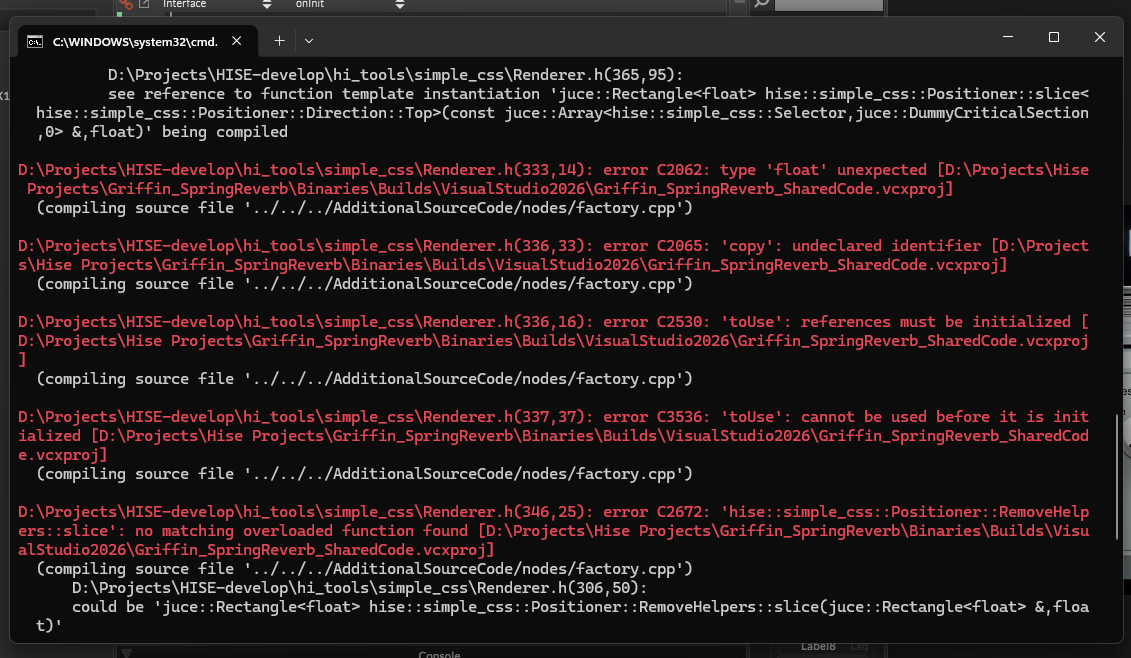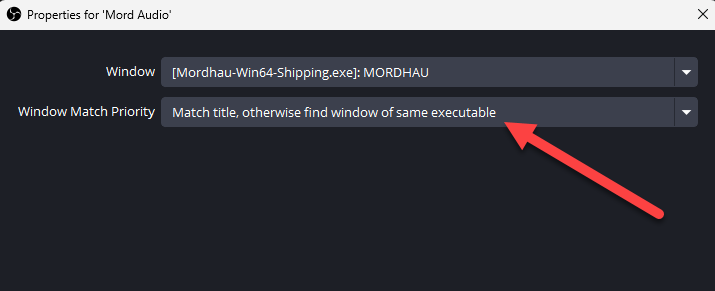Latest Hise Build, Juce 6.
I am unable to export to VST3 on Windows.

Full Console:
Re-saving file: D:\Projects\Hise Projects\Griffin_Test\Binaries\AutogeneratedProject.jucer
Finished saving: Visual Studio 2026
Finished saving: Xcode (macOS)
Finished saving: Xcode (iOS)
Finished saving: Linux Makefile
Compiling 64bit FX plugin Griffin_Test ...
MSBuild version 18.3.0-release-26070-10+3972042b7 for .NET Framework
Plugin.cpp
PresetData.cpp
factory.cpp
D:\Projects\HISE-develop\hi_tools\simple_css\Renderer.h(333,4): error C2872: 'Rectangle': ambiguous symbol [D:\Projects
\Hise Projects\Griffin_Test\Binaries\Builds\VisualStudio2026\Griffin_Test_SharedCode.vcxproj]
(compiling source file '../../../AdditionalSourceCode/nodes/factory.cpp')
C:\Program Files (x86)\Windows Kits\10\Include\10.0.26100.0\um\wingdi.h(4639,24):
could be 'BOOL Rectangle(HDC,int,int,int,int)'
D:\Projects\HISE-develop\JUCE\modules\juce_graphics\geometry\juce_Rectangle.h(66,7):
or 'juce::Rectangle'
D:\Projects\HISE-develop\hi_tools\simple_css\Renderer.h(333,4):
the template instantiation context (the oldest one first) is
D:\Projects\HISE-develop\hi_tools\simple_css\Renderer.h(365,95):
see reference to function template instantiation 'juce::Rectangle<float> hise::simple_css::Positioner::slice<
hise::simple_css::Positioner::Direction::Top>(const juce::Array<hise::simple_css::Selector,juce::DummyCriticalSection
,0> &,float)' being compiled
D:\Projects\HISE-develop\hi_tools\simple_css\Renderer.h(333,14): error C2062: type 'float' unexpected [D:\Projects\Hise
Projects\Griffin_SpringReverb\Binaries\Builds\VisualStudio2026\Griffin_Test_SharedCode.vcxproj]
(compiling source file '../../../AdditionalSourceCode/nodes/factory.cpp')
D:\Projects\HISE-develop\hi_tools\simple_css\Renderer.h(336,33): error C2065: 'copy': undeclared identifier [D:\Project
s\Hise Projects\Griffin_Test\Binaries\Builds\VisualStudio2026\Griffin_Test_SharedCode.vcxproj]
(compiling source file '../../../AdditionalSourceCode/nodes/factory.cpp')
D:\Projects\HISE-develop\hi_tools\simple_css\Renderer.h(336,16): error C2530: 'toUse': references must be initialized [
D:\Projects\Hise Projects\Griffin_Test\Binaries\Builds\VisualStudio2026\Griffin_Test_SharedCode.vcxproj
]
(compiling source file '../../../AdditionalSourceCode/nodes/factory.cpp')
D:\Projects\HISE-develop\hi_tools\simple_css\Renderer.h(337,37): error C3536: 'toUse': cannot be used before it is init
ialized [D:\Projects\Hise Projects\Griffin_Test\Binaries\Builds\VisualStudio2026\Griffin_Test_SharedCod
e.vcxproj]
(compiling source file '../../../AdditionalSourceCode/nodes/factory.cpp')
D:\Projects\HISE-develop\hi_tools\simple_css\Renderer.h(346,25): error C2672: 'hise::simple_css::Positioner::RemoveHelp
ers::slice': no matching overloaded function found [D:\Projects\Hise Projects\Griffin_Test\Binaries\Builds\Visu
alStudio2026\Griffin_Test_SharedCode.vcxproj]
(compiling source file '../../../AdditionalSourceCode/nodes/factory.cpp')
D:\Projects\HISE-develop\hi_tools\simple_css\Renderer.h(306,50):
could be 'juce::Rectangle<float> hise::simple_css::Positioner::RemoveHelpers::slice(juce::Rectangle<float> &,floa
t)'
D:\Projects\HISE-develop\hi_tools\simple_css\Renderer.h(346,25):
Failed to specialize function template 'juce::Rectangle<float> hise::simple_css::Positioner::RemoveHelpers::s
lice(juce::Rectangle<float> &,float)'
D:\Projects\HISE-develop\hi_tools\simple_css\Renderer.h(346,25):
With the following template arguments:
D:\Projects\HISE-develop\hi_tools\simple_css\Renderer.h(346,25):
'D=hise::simple_css::Positioner::Direction::Top'
D:\Projects\HISE-develop\hi_tools\simple_css\Renderer.h(306,33):
'Rectangle': ambiguous symbol
D:\Projects\HISE-develop\hi_tools\simple_css\Renderer.h(306,42):
syntax error: missing ';' before '<'
Press any key to continue . . .
Is this a bug, or something I've not set up correctly on my end?


